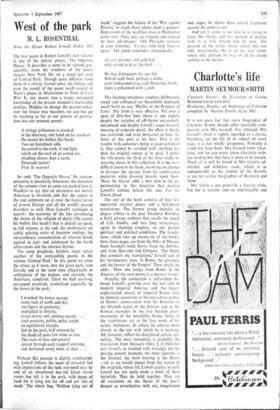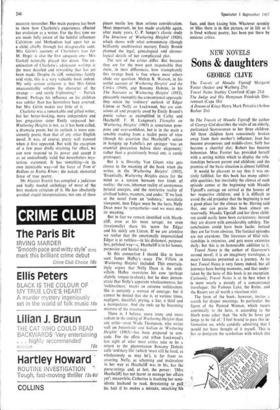Charlotte Bronte: die Evolution of Genius Winifred Gdrin (our. 63s)
Charlotte's life
MARTIN SEYMOUR-SMITH
Wuthering Heights: on Anthology of Criticism compiled by Alastair Everitt (Cass 30s)
It is not quite fair that every biographer of Charlotte Bronte should suffer inevitable com- parison with Mrs Gaskell. For although Mrs Gaskell's book is rightly regarded as a classic, breathing out the life of its subject on every page, it is not wholly scrupulous. Probably it could not have been. Mrs Gaskell knew Char- lotte, and we can never know Charlotte with- out reading her; but there is more to be known. Much of it will be found in Mrs Gerin's ad- Mil-able and definitive study, which is as indispensable to the student of the Brontes as are her earlier biographies of Branwell and Anne.
Mrs Gerin is not primarily a literary critic, but she is sensible and an indefatigable and accurate researcher. Her main purpose has been to show how Charlotte's experiences affected her evolution as a writer. For the first time we are made fully aware of the baleful influences Calvinism and Methodism had upon her as a child, chiefly through her disagreeable aunt. Mrs Gain's account of Charlotte's love for M. Heger is also the first adequate one—Mrs Gaskell naturally played this down. The ex- amination of Charlotte's adolescent writings is the most detailed and rewarding that has yet been made. Despite its stiff, sometimes faintly arid style, this is a very valuable book indeed. My only serious criticism is that Mrs Gerin unaccountably softens the character of the strange — and surely frightening? -- Patrick Brontt. Perhaps his influence on his children was subtler than has heretofore been asserted; but Mrs Gerin makes too little of it.
Charlotte was a remarkable and gifted writer, but her better-looking, more independent and less gregarious sister Emily surpassed. her. Wuthering Heights is not, as it has been called, a dramatic poem; but its outlook is more con- sistently poetic than that of any other English novel. It was, of course, pretty well damned when it first appeared. But with the exception of a few poor drolls straining for effect, we can now respond to its power and accept it as an undoubtedly valid but nevertheless mys- terious statement. It has something—in its own inimitable way—of the force of Tom'o'' Bedlam or Kubla Khan: the naked, elemental force of true poetry.
Mr Alastair Everitt has compiled a judicious and badly needed anthology of most of the best modern criticism of it. He has absolutely avoided stupid interpretations; not one of these
pieces merits less than serious consideration. Most important, he has made available again, after many years, C. P. Sanger's classic study The Structure of 'Wuthering Heights' (1926); which shows with what consummate (though brilliantly unobtrusive) mastery Emily Bronte planned the legal, genealogical and chrono- logical details of her complicated plot.
The rest of the critics differ. But because they are for the most part responsible they show, in their differences, how triumphantly this strange book is free where most others abide our question. Melvin R. Watson, in his useful account of 'Wuthering Heights' and the Critics (1949), and Bonamy Dobrde, in his The Narrator in 'Wuthering Heights' (1953), pleasantly exemplify the conventional approach: they retain the 'ordinary' outlook of Edgar Linton or Nelly or Lockwood, but are con- scious of and properly awed by Emily Bronte's poetic values as exemplified in Cathy and Heathcliff. F. • H. Langman's Thoughts on 'Wuthering Heights' (1965) is sometimes pom- pous and over-confident, but is in the main a sensible reading from a realist point of view (though his assertion that Heathcliff's action in hanging up Isabella's pet springer 'was an essential precaution before their elopement,' rather than a gratuitously brutal one, is surely grotesque).
But it is Dorothy Van Ghent who gets closest to the meaning of the book when she writes, in On 'Wuthering Heights (1953), 'Essentially, Wuthering Heights exists for the mind as a tension between two kinds of reality: the raw, inhuman reality of anonymous natural energies, and the restrictive reality of civilised habits, manners, and codes.' If we look at the novel from an 'ordinary,' moralistic viewpoint, then Edgar must be the hero, Nelly Dean must be sympathetic—and we must miss its meaning.
But in fact we remain identified with Heath- cliff, even at his most savage; we even (irrationally) share his scorn for Edgar and his sickly son Linton. If we are attentive we realise that the emotionally impoverished Edgar is as ruthless—in his dishonest, purpose- less, polished way—a.. Heathcliff is in his honest, purposive and bestial way.
In this connection I should like to have seen James Hafley's essay The Villain in 'Wuthering Heights' included. This entertain- ingly argues that Nelly Dean is the arch- villain. Hafley overstates his case (perhaps slightly tongue-in-cheek), but he does demon- strate that Nelly's apparent wholesomeness, her 'ordinariness,' masks an extreme ruthlessness. She is certainly a woman of courage; but it cannot be denied that she is, at various times, negligent, deceitful, prying, a liar, a thief and a manipulator. And she ends up by becoming mistress of the situation.
There is, I believe, more irony and more sadism in the ending of Wuthering Heights than any critic—even Wade Thompson, who writes well on Infanticide and Sadism in 'Wuthering Heights' (1963)—has been prepared to con- cede. For the effete and urban Lockwood's last sight of what most critics take to be a return to the phenomenon Bonamy Dobrde calls 'ordinary life' (which 'must still be lived, as wholesomely as may be'), is far from re- assuring. Nelly, as scheming and malevolent in her way as Heathcliff was in his, has the purse-strings and, at last, the power: '[Mrs Heathcliff] has not learnt to manage her affairs yet'; meanwhile, Catherine is teaching her semi- idiotic husband to read, threatening to pall: his hair if he makes a mistake, smacking-his face, and then kissing him. Whatever serenity or bliss there is in this picture, or in life as it is lived without poetry, has been put there by anxious critics.































 Previous page
Previous page